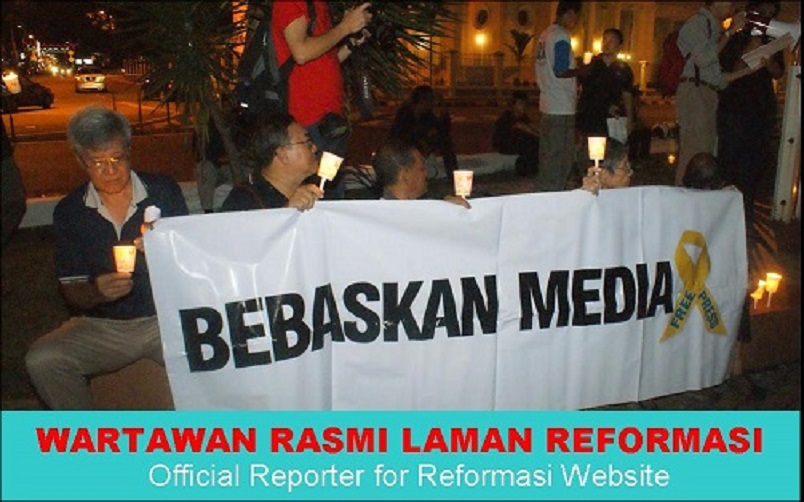Trengganu MB crisis: Follow the money trail
I spent a couple of years in Trengganu when I was a kid. I have fond memories of a tranquil and rustic state, wonderful childhood neighbours - whom I have recently been reacqainted with after all these years - and family picnics at Pantai Chendering.
So the high stakes battle in Trengganu over the choice of Mentri Besar is of special interest to me.
While much has been said about the constitutional position, there is more to it than just the letter and spirit of the law.
There is more to it than that - and it is essential that we consider this dimension in any discussion of the political situation in Trengganu.
Follow the money trail.
One of the key issues, I believe, is how the Petronas oil royalties due to the state amounting to some RM1 billion annually should be spent - for the benefit of the people or for vested interests. Despite its oil wealth, Trengganu is one of the poorest states in the federation.
The royalty payments are no small change. In the past, the money was paid directly to the state government and dispensed under its supervision.
But when Trengganu fell to opposition hands (Pas) in 1999, then prime minister Mahathir changed the rules. He couldn’t bear to see all that money going to an opposition-controlled state government.
Instead of the Petronas royalties (amounting to 5 per cent of oil extraction and sales) going directly to the Trengganu state government, they were now channelled to a federally administered Special Fund Financing Programme (the Fund), which was established in December 2000. The money in this new Fund was euphemistically renamed “goodwill money” (wang ihsan) and it was supposed to directly finance development programmes for the people of Terengganu, largely bypassing the state government.
Since then, there has been little accountability over how this money has been spent and whether the projects really benefit the ordinary people.
The missing Accounts Committee
Basically, the Treasury is supposed to make allocations out of the Fund to various ministries (and via these ministries to federal agencies), financial institutions, and federal and state-level offices.
According to the Auditor General’s Report 2005, in line with a directive, the Treasury was supposed to create an Accounts Committee, chaired by the Treasury’s Chief Secretary, to administer the Fund. The Committee was supposed to comprise representatives from the Prime Minister’s Department (including the Economic Planning Unit), the Treasury, and the Finance Ministry.
But the Auditor General (AG) said then that such a Committee had not been set up – surely this must be of serious concern.
Instead, a “Central-level Committee”, which appears less high-powered, was formed. This Committee, which includes representatives from ministries and implementation agencies, meets twice a year to discuss and approve allocations. It is not clear who exactly is in this Committee. PM Abdullah must reveal the composition of this committee.
This Central-level Committee is supposed to evaluate projects and recommend to the Cabinet financial allocations for the various states. But the AG said he found that allocations for the various states were not decided during the Committee’s meetings. Instead, the “allocations were based on the approval of the Finance Minister and they were forwarded straight to the relevant state Menteris Besar”. The Finance Minister is of course the Prime Minister.
Would that explain why Abdullah Badawi is so keen on retaining Idris as MB?
In an article for Aliran Monthly, ‘Buying goodwill - RM4 billion worth of it’, I wrote back then that although the AG had said that the people had benefited from the Fund, his finding was not backed up by empirical evidence. He conceded that, at the state level, “expenditure that should not have been financed from the Special Fund allocation had occurred and this had more or less jeopardised the objective of the programme”.
He also found that not all ministries, departments and agencies had submitted their quarterly expenditure statements as required (though he said their monitoring work was adequate). This meant the Treasury’s records related to the Fund were incomplete. More seriously, there was no evidence to show that the Treasury had taken follow-up action. He also stressed that all allocations should be approved by the Central-level Committee.
Reading between the lines, it seemed to me, that there was a lot of arbitrary discretion being exercised as to how the fund was being administered – most likely to serve the interests of the ruling party while benefiting certain vested interests.
The best solution is to return the royalties to the state governments. High-powered independent audit committees with opposition representation, reporting to the respective state assemblies, should be set up to ensure that such funds are used on projects that really empower the rural poor. This will dispel the perception that this ‘goodwill money’ is being used as a patronage tool to boost political ‘goodwill’ for the Barisan Nasional while also benefiting vested interests.
I would hazard a guess that the Agong, who is the Sultan of Trengganu, knows what is going on and is deeply concerned.
Here’s one intriguing question: If a new MB who is not the PM’s choice is sworn in, would the files of yet another state government disappear?
Right now, it’s a battle of wills.
Even though Abdullah’s choice of MB has the backing of all the BN assembly members, would the weakened PM ram him through and risk having to face another state election in Trengganu? This time, Pas and PKR, fresh from their successes on the west coast, could well pose a stronger challenge.

No comments:
Post a Comment